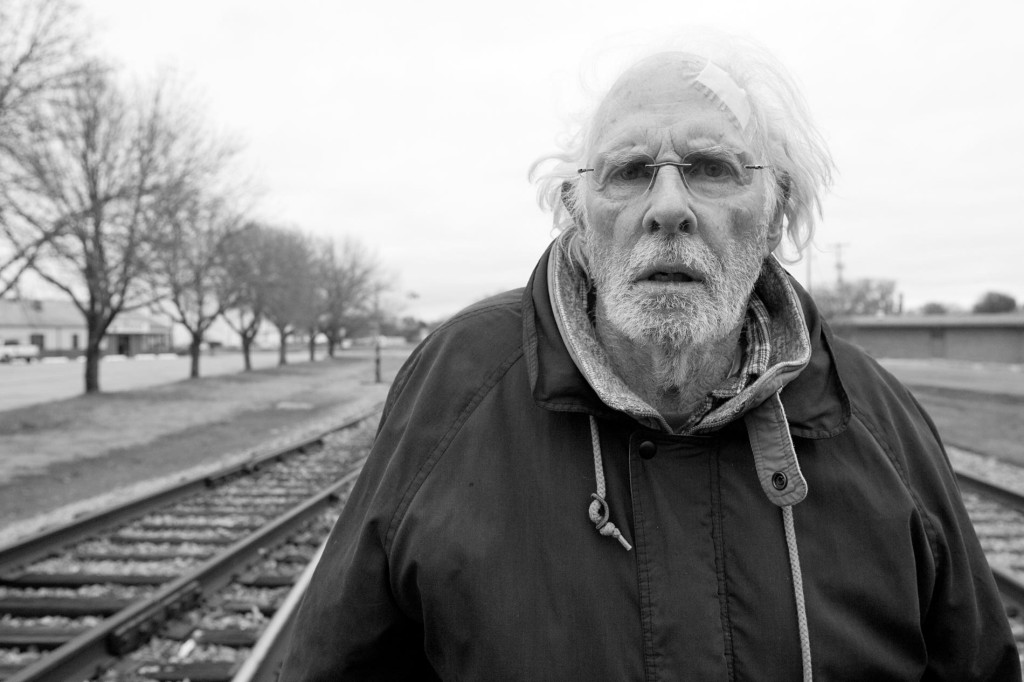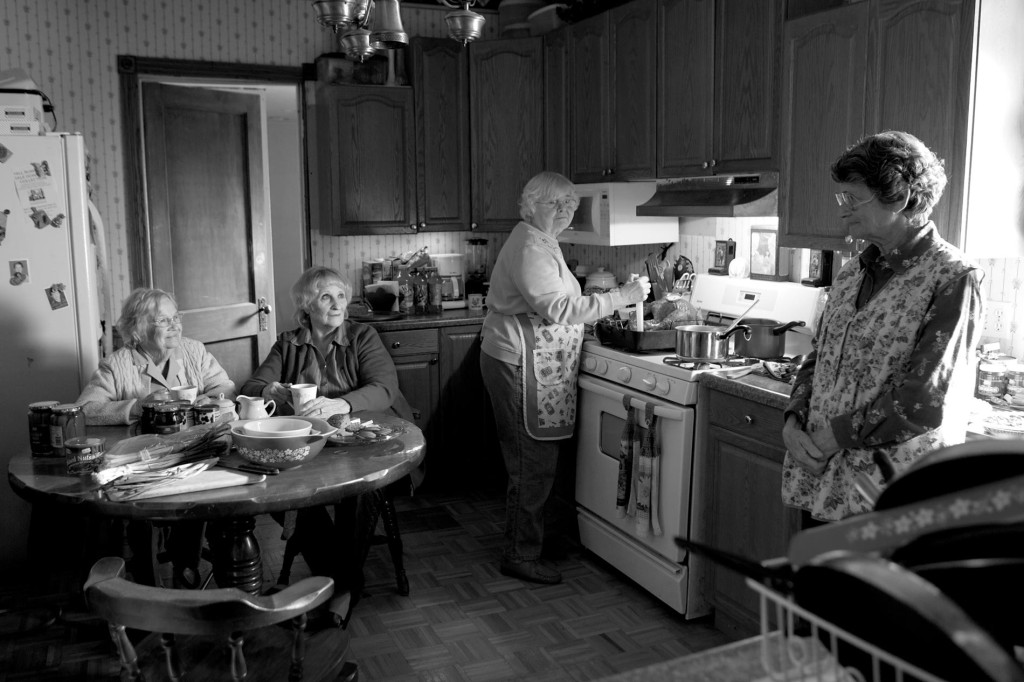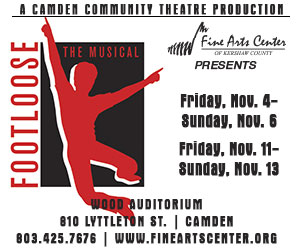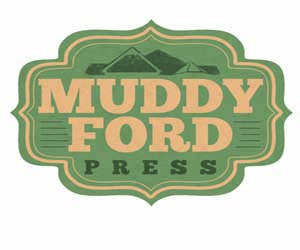
Bruce Dern stars as Woody Grant in Alexander Payne’s “Nebraska”

Nebraska is a powerful story of the relationship between fathers and sons.
“This is the power of this film. It captures honest, tender moments between a father and son, when defeat is admitted, the truth is realized. … Rarely has this been shown so beautifully in a film.” – WS
No matter the personality of our parents, their own personal history is selectively given to us as we grow older. They seem to censor the information, choosing what is appropriate for us to hear and to learn as children, then, as we grow older and life as a family takes over, the stories that are re-told seem to revolve around the more pleasant memories. As children, this is only recognizable to us as we grow older and are able to relate to the experiences of our parents. Nebraska, from Director Alexander Payne, is a simple story of family that approaches those moments when children begin to see a small part of the world through the their parents’ eyes and understand the choices they made years before.
Veteran character actor Bruce Dern (Big Love, Coming Home) plays Woody Grant. Grant has received a letter in the mail claiming that he is the recipient of a million dollars. In the opening scene, Woody is stopped by a police officer while walking on the side of the road in his home of Billings, Montana as he begins his journey to Lincoln, Nebraska to collect his prize. His youngest son David, played by Saturday Night Live alum Will Forte, is called to the local police station to pick up his father. After seeing the letter David attempts to convince his father that it is a scam. Payne gives us a clean, close shot of the letter, communicating to the audience that, without question, Woody is walking toward a disappointing reception. Stubborn and confused, Woody refuses to accept that the letter is fake and makes it known that he will travel to Lincoln to collect his prize.
David Grant, at a crossroads in his own life, sells stereo equipment in Billings. A thankless job that he struggles with. His older brother Ross, played by an understated Bob Odenkirk, is on-air talent at a local television affiliate and is seen as the star of the family. June Squibb has the role of Kate Grant, Woody’s shrill voiced, wife, who is as much critical of Woody as she is concerned. After a second attempt to walk his way to Lincoln and collect his prize, Woody asks his son to drive him to Lincoln. “What the hell else do you have to do” Woody crackles at his son, and the two set off through the plains of the Midwest.
Nebraska could be viewed as the third in a trilogy of cathartic road movies from Payne, preceded by About Schmidt (2002) and Sideways (2004). Dern’s Grant is an old drunk. Woody is viewed by his sons as a man who cared more about drinking than being a father. A soft-hearted David views this trip as a way of connecting with his father. The similarity between the two men is obvious. Both men are stubborn and weak in the same breath.
The turning point of the film is during a short detour David takes, at the beginning of the trip, to view Mt. Rushmore. Thirty minutes off the Interstate, the father and son stand beside their parked car outside the park entrance. Woody looks curiously at the monument. “What do you think?” David asks. “It doesn’t look finished” his father responds. Standing below the patriarchs of our country, the meaning is clear. Payne sets the scene as a wide shot, outside the gates. He lets us see the reality we all eventually witness when we visit an iconic area: entrance gates, waiting in line, the banal efforts that are never seen in promotional posters and history books. On this trip, we will all share Woody Grant’s trip through an unfinished life of small regrets.
As father and son continue down the Interstate, Woody leans against the passenger side door, much like a dog seeing a world that is recognizable but completely new. During rest stops, David urges his father to not start drinking again. Dern’s drunken entrance into their hotel room ends with a gash on his head that lands him in the hospital for a day. Cautious at traveling any further, David calls his mother and plans are made for Kate to join them and to reunite Woody and his brothers for a meeting in their hometown in Nebraska.
When Woody and David arrive at his brother’s home they are greeted by Aunt Martha, played by Mary Louise Wilson. It one of the most wonderfully simple scenes in the film. Having not seen each other in decades, she feels the responsibility to hug and be courteous. They are family, but there is an awkwardness to the hugs that is familiar and unspoken. Payne’s humor pops up again when we meet his brother Ray, played by Rance Howard- father to director Ron Howard and grandfather to actress Bryce Dallas Howard. A post-modern theme of the patriarch begins to show itself. Dern was formerly married to actress Diane Ladd and is father to academy award nominated actress Laura Dern. It is a brief tip of the cap to all patriarchs of American cinema. The joy of having two well-oiled, Hollywood character actors share the screen is a pleasant surprise.
David and Woody slump into a local tavern, Woody reunites with his former business partner Ed Pegram, played by an always welcome Stacy Keach. While his son is in the bathroom of the bar, Woody prematurely, lets word out that he has come into money. Word spreads quickly around town that Woody has come into a million dollars and quickly becomes the talk of the town. Old friends and acquaintances begin to seek out Woody and congratulate him on his good fortune.
David takes it upon himself to squash the news of his father’s false good fortune. He visits the local newspaper. Word has spread and the paper wants to do a story on Woody’s homecoming and recent winnings. There he meets Woody’s former high school girlfriend, Peg Nagy, beautifully played by Angela McEwan. Surprised by the news that his father ever dated anyone other than his mother, David listens as Peg describes a father that he never knew. David learns deeper details about his father’s service. Woody was a Korean War veteran. A spot on character background by Payne. Known as “The Forgotten War,” Korean veterans have always been shifted aside in history books—sandwiched between the honor of World War II and the conflict of Vietnam. Woody Grant is the embodiment of this.
The story becomes a bit uneven at this point. Woody’s wife has joined her husband and son and quickly begins reuniting with the women of the family. Sitting around the kitchen table, the women of the family begin gossiping like school girls, as if they picked up a conversation that paused years before. But soon, as word has spread to all points of the town that Woody is rich, the hard off residents, including immediate family, begin pressuring Woody for money. Ed Pegram traps David in a tavern’s bathroom, bringing up decades old loans he lent Woody. At a family reunion, in-laws trap David and Ross, pressuring them to settle up on old debts. David’s two cousins, two bumbling caricatures with less than mediocre ambition, set up a half-baked mugging to steal Woody’s prize letter.
The whole section seems obvious. Intended to open Woody up as the gentle caring member of the family, it instead paints the entire family in a negative way, destroying the earlier set-ups of family; men watching football, the women cooking and gossiping. They are not at all likable anymore and that taints the honesty of the story.
“Nebraska” also falls onto a bit of a crutch as Woody’s wife Kate visits the local cemetery to pay her respects to family members. Filled with a new energy after leaving Montana, Kate finds her youth. But this quickly devolves into her own personal high school tales of teenage boys from the town trying to get more from her than a simple kiss. It is the funniest scene of the movie, but shouldn’t be. The brashness overshadows the effect that her words have on Woody. After her third crass tale of teenage lust, Woody slumps away. It is a tender moment of genuine pain, but is easy to lose in the laughter.
Two films quickly come to mind while watching Nebraska– David Lynch’s The Straight Story and Peter Bogdanovich’s The Last Picture Show. The Straight Story for its stubborn lead character played by Richard Farnsworth as he travels on a lawnmower to reunite with his brother and The Last Picture Show for its black and white film palette of a barren Texas town.
Black and white is always a misnomer when speaking of cinematography. The beauty is always in the mid tones. Payne and collaborator, cinematographer Phedon Papamichael, give us a harsh canvas of Midwestern life. Payne demanded for years that this film be shot in black and white. It is a decision that triumphs. From the opening frame of Woody walking on the side of the road to the grey images of David’s stereo store set inside a run-down strip mall, there is a specific tone of honesty that is set early in the film. As the two travel on the barren Interstate, the flat plains, filled with dirty, half melted snow, make us feel harsh winter crosswinds blowing across our faces. And when the camera is set at the end of the bar in any of the multiple taverns the father and son visit, the harsh Midwestern lines on chiseled faces of the men and women planted on their stools, beers gripped stoically in their hands, give us a solid sense of place. We know these characters without having to hear any words at all.
Ultimately, the town finds out that Woody is chasing fools’ gold and begins to mock him. They take advantage of his fragile mind as they took advantage of his generosity years before. David witnesses this first hand. It is a moment between a father and son that is painful to watch. No matter the strength of a father through a son’s eyes, it is wrenching to watch him in a true moment of weakness. This is the power of this film. It captures honest, tender moments between a father and son, when defeat is admitted, the truth is realized. After years of poor decisions that have stained a paternal relationship, the reasons for those decisions are realized by a son. In that moment there could not be a stronger bond than family. Rarely has this been shown so beautifully in a film.
Nebraska is not a lyrical film. It is not an overarching metaphor for the current state of family. Nebraska is the very definition of a small movie. Through its gentle hand-holding it leads us through one singular moment where a son begins to understand his father’s life. Dern brings a depth of honesty to his role that only comes with decades of experience. Forte’s work holds promise for future roles outside sketch comedy. June Squibb threatens to steal the film as Woody’s wife, but Payne’s smart direction rides her brashness at just the right level. The film is uneven at times, as Payne seems to grit his teeth, unable to hold back his superb ability to get a smart laugh through a sight gag. But these are small interruptions that do nothing to take away from the pleasure of riding with Woody and David as they begin to listen to what each other is saying, if only through short bursts of words, grunts and shrugged shoulders. This is most evident in their first scene together in a bar when Woody stares directly into his adult son’s eyes and states, “Come on, don’t you want to have a beer with your old man?” For any son, it is a moment of comfort that can’t be put into words.
— Wade Sellers
Nebraska plays at the Nickelodeon Theatre through January 2nd. Visit www.nickelodeon.org for times and ticket information.






.jpg)